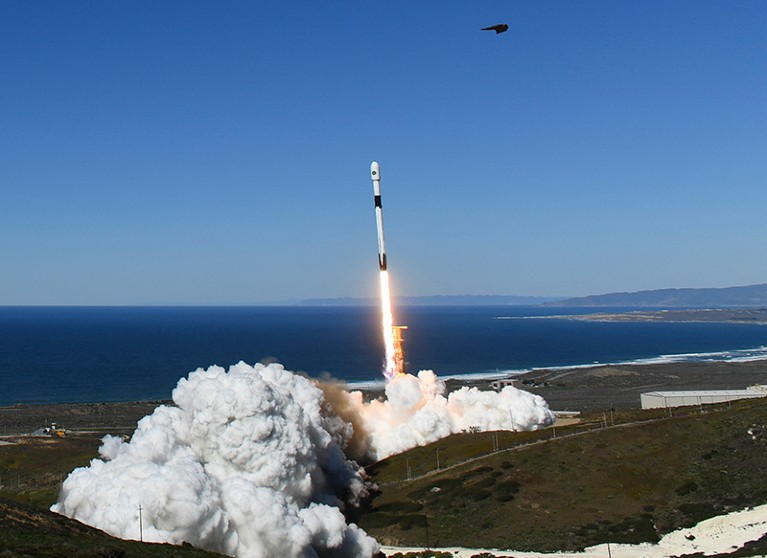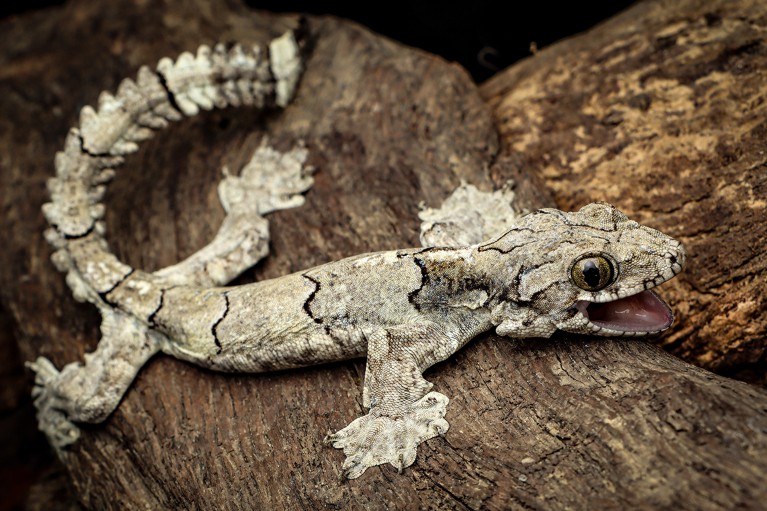Hello Nature readers, would you like to get this Briefing in your inbox free every day? Sign up here.

A bird takes flight as the private spaceflight firm SpaceX launches a rocket from Vandenberg US Space Force Base in Lompoc, California.Credit: Patrick T. Fallon/AFP Via Getty
How rocket launches impact wildlife
Scientists will, for the first time, assess whether the thunderous noise of rocket launches harms endangered animals that live around California’s Vandenberg Space Force Base, one of the world’s busiest spaceports. Chronic noise pollution — from cities or car or boat traffic, for example — is known to increase animals’ stress levels. Over the next three years, cameras and audio monitors will capture whether creatures change their behaviour, such as birds abandoning their nests or altering their songs, in response to the extremely loud launches. The number of yearly launches at Vandenberg is set to rise from 5—15 to up to 100 by 2030.
Game-changing obesity treatments
Anti-obesity medications that mimic the hormone GLP-1 — semaglutide (sold under the brand names Ozempic, Wegovy and Rybelsus) and tirzepatide (Mounjaro) — are proving shockingly effective at causing weight loss. Now, health-care providers are getting to grips with how to best use them. This includes categorizing obesity to identify who is likely to benefit the most from the drugs, studying how long people will have to stay on them and fine-tuning doses to avoid downsides, such as muscle loss.
Why orcas are attacking boats in Spain
Orcas (Orcinus orca) have sunk three boats off the Iberian coast of Europe, and the behaviour seems to be spreading. Biologists first noted the trend in 2020. They suspect that it is a defensive behaviour, which originated with a female orca nicknamed White Gladis after it experienced an unknown trauma. Iberian orcas are critically endangered, and only 39 were recorded in the last census, in 2011.
Reference: Marine Mammal Science paper
Features & opinion
The mental-health crisis gripping science
Researchers at all career stages and across the world are experiencing bullying and discrimination, anxiety and depression, financial stress and poor work–life balance. Large studies have provided hard data on how dire the situation is, particularly for members of under-represented groups. What exactly needs to change is far from clear. Many scientists agree that talking about mental health has to become normal. There are programmes that tackle equity issues, and unions are pushing for better working conditions. Others argue that academia needs larger, systemic changes, including zero tolerance for abuse, and drastic changes to funding structures. “This really is a problem that could potentially affect the future of science if we can’t retain young talent,” says sociologist Brandon Vaidyanathan.
How to start a quantum-sensor revolution
Quantum sensors, which exploit the fundamental properties of atoms and light to make extremely precise measurements of the world, could revolutionize brain imaging, remote imaging and navigation. “Many people — including business leaders — think quantum technologies are devices of the future, not the present,” write a group of quantum researchers who are hoping to change that. They lay out five priorities for commercializing quantum sensors, including making them more robust and integrating them into existing systems. And unlike quantum computers, which might be decades away from being better than classical computers, quantum sensors are already used in the laboratory and are ready to be adopted more widely.
The IPCC needs its own net-zero target
The United Nations Intergovernmental Panel on Climate Change (IPCC) should practise what it preaches and aggressively limit its own emissions, argues climate scientist Benjamin Sanderson. Replacing in-person meetings, and the requisite long-haul flights, could drastically cut its carbon footprint while decreasing demographic and social barriers to attending. “IPCC members should remember that nobody is better placed to demonstrate how to eliminate emissions,” Sanderson says.
Image of the week

Credit: Lal Muansanga
This stunning creature is a Gekko mizoramensis, a parachute gecko species that’s new to science. Parachute geckos use skin flaps along their bodies, limbs and tails to glide from tree to tree. Discovered by biologists in northeastern India, the gecko is proof that animal and plant life in the region remain poorly documented. (Nature | 2 min read)
